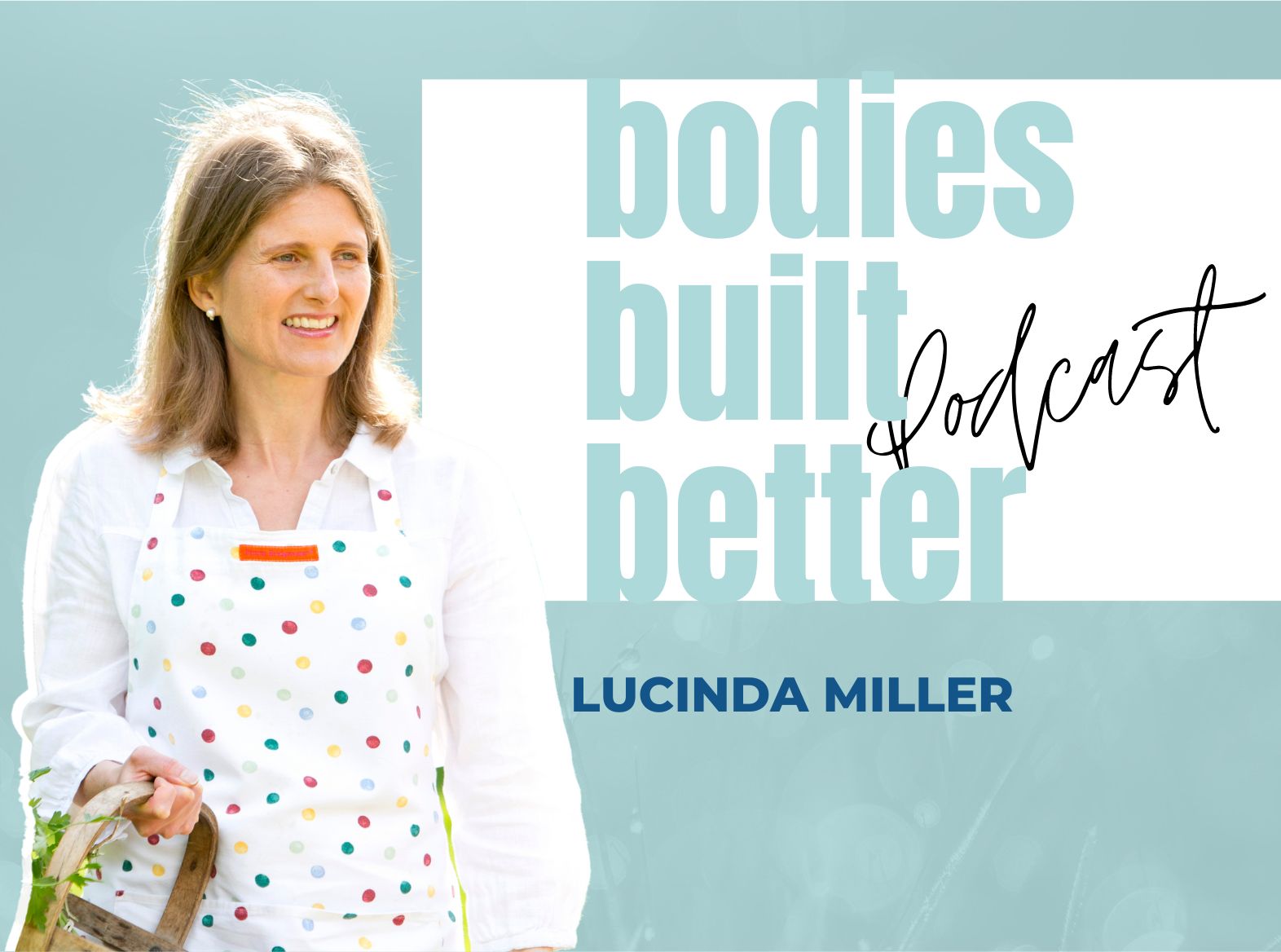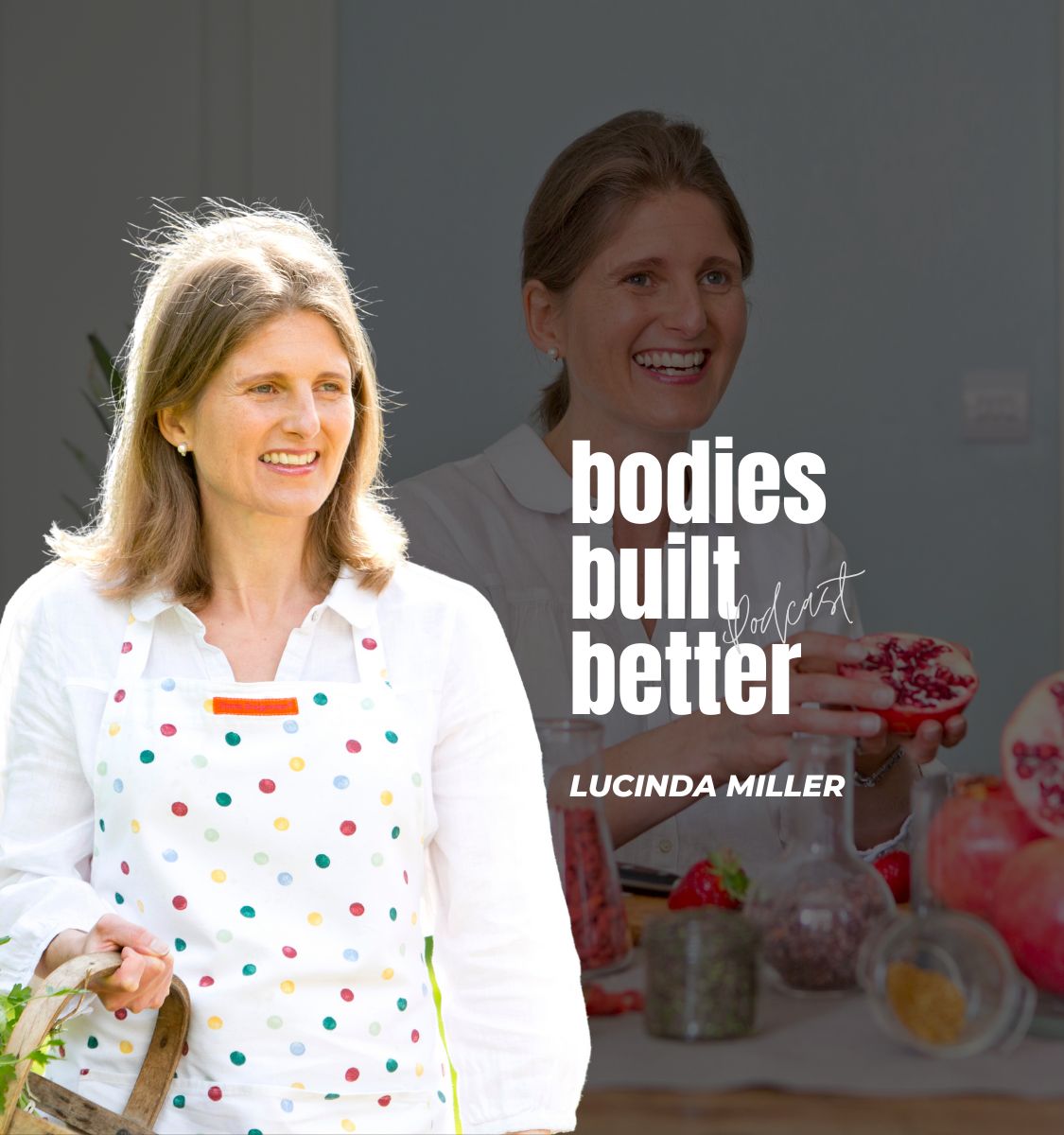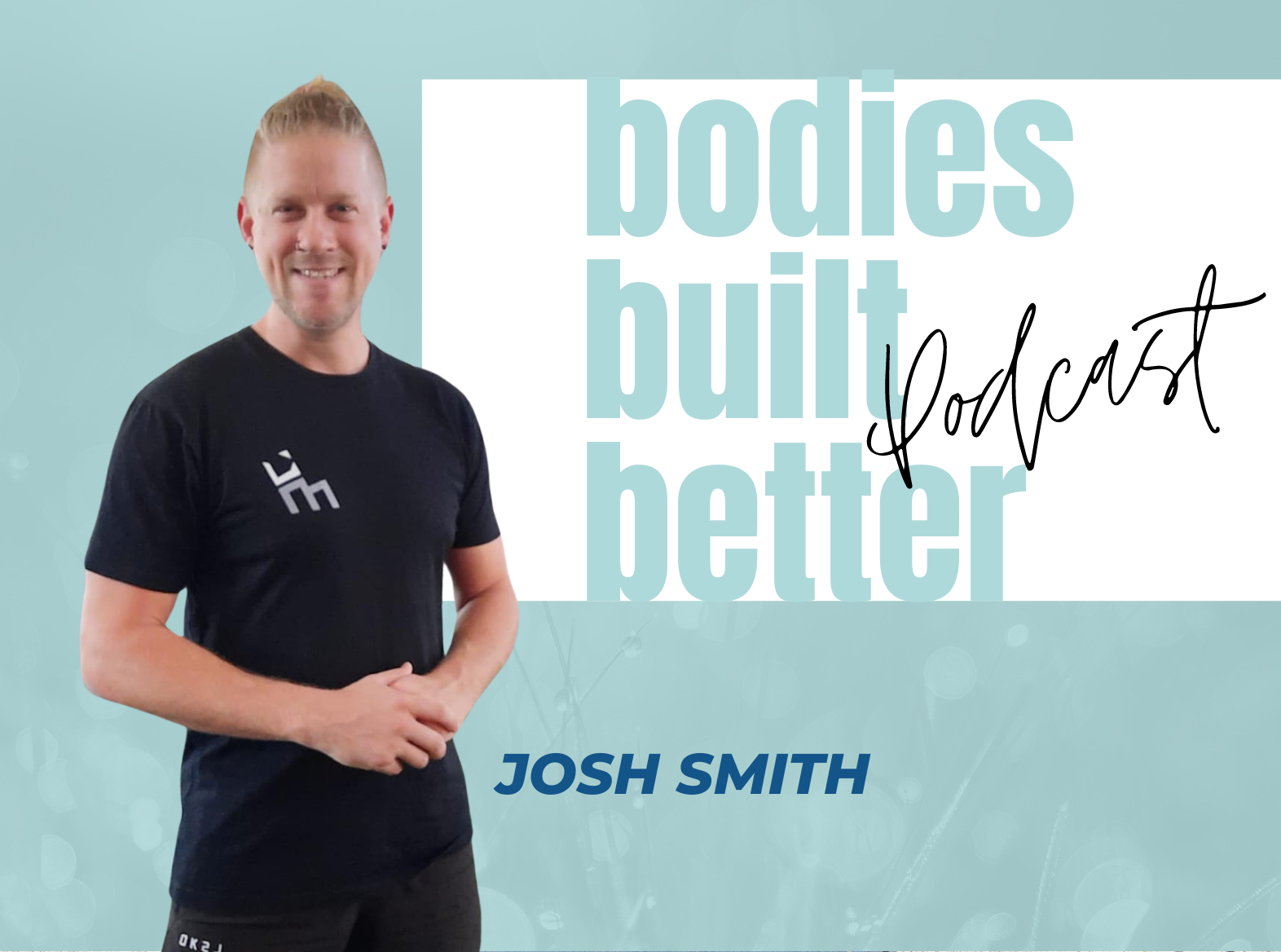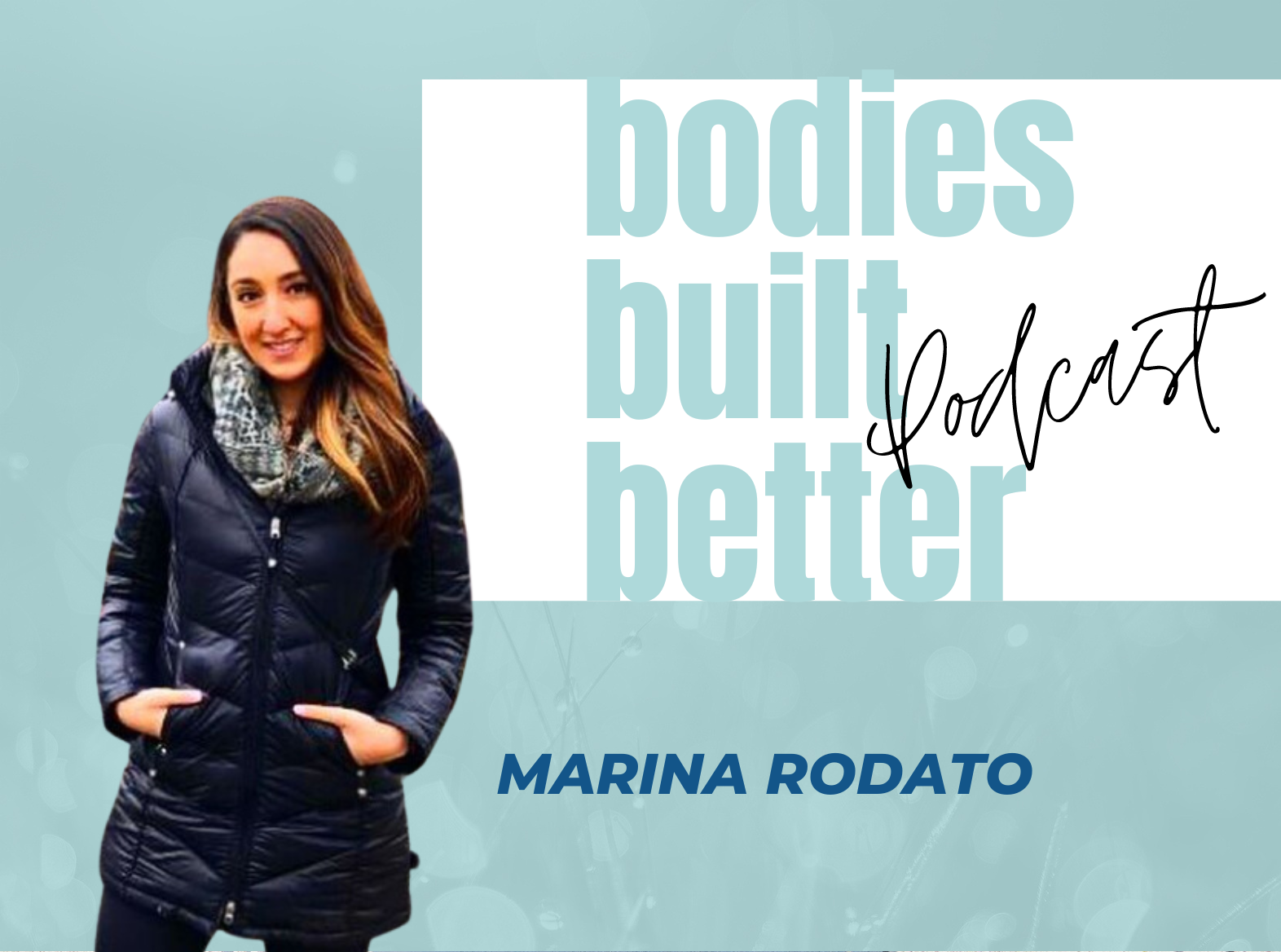The Role of the Thyroid in Health and Well-Being
Jackie 3:29
So let’s dive straight into this jam-packed episode with Lucinda Miller. Lucinda, thank you so much for chatting with me today. Welcome to the Body’s Built Better Podcast.
Lucinda 3:42
Jackie, it’s great to be here. Thank you so much for inviting me on.
Jackie 3:46
It’s such a pleasure. We are talking all things thyroid and health. And the listeners would know that I’ve had my own thyroid journey and still on it. And it was one of those things where I was basically told there’s nothing you can do until it gets so bad that we surgically remove it. Which is completely shocking to me and also heartbreaking because I’m someone who wants to play a real active role in my health and well being. And so I’ve been doing that this whole time. And I recently came across an interview that you did on another podcast, and you are so wonderful at explaining, you know what the thyroid is and how you can help it and that specifically has already helped me. I’ve implemented a couple of things from that interview. And so I’m so excited to have you here and chat with you. I know you have your own thyroid story and journey. Could you start by sharing that with us?
Lucinda 4:50
Yes, absolutely, Jackie. So my mum had a hypothyroid–low thyroid function. My aunt the same thing. So I was kind of expecting it to happen at some point. And my mum also had type one diabetes. So we’ve got a lot of autoimmunity in the family. So, again, that was something I was kind of, you know, thinking, well, I’m going to do my absolute best. And I remember whenever I did a blood test, so do you know you’ve got perfect bloods? And I was like, “Yes, I’m rocking it.” But my hair’s falling out. I’m feeling really tired. I’ve got brain fog. And but they couldn’t, you know, my bloods weren’t telling me what was really going on. And it was actually by mistake, I was sent a lovely blood test, probe blood test by a company to do as a freebie. So I thought, right, well, I’d give it a go. And I’d never had my thyroid antibodies checked, I’d only had the baseline, TSH, thyroid stimulating hormone, which is the main one that everyone does, sometimes you get T for them. But both basically, those are always spot on. Perfect. And anyway, I got the results back a couple of days later, and there were these thyroid antibodies super high. And I thought, “Oh, my goodness, I think this is Hashimoto’s. This is something I’ve always read about.” Some of my clients are come with–to see me with. But I just hadn’t added up myself and I’m a naturopath. I’ve been doing this for years. But because this TSH, which is that sort of key marker was one. And basically the proof of this reference range for your TSH is naught point three, five to five, depending on which country you live in. Sometimes it’s four and a half, sometimes it’s five and a half, but generally, and so one is steemed as absolutely spot on perfect. And it always was. So that’s why I just thought there’s no way I could have Hashimoto’s and also have perfect TSH. But I learned through myself that it was possible. So immediately, I went to see my GP, my doctor. And I said, heck, look at this. Isn’t this crazy? And she said, Yeah, gosh, I haven’t seen that before. And I said, “Is there anything you can do?” And she goes, “Well, the problem is we treat TSH, we treat that marker. So if it’s one, we really can’t do anything about it until it goes right up. And then you’ve got low thyroid function.” She said what I can do is to check you in case something else is going on. At the time, I have got a sore throat today. So this is a random sore throat. But at the time I had a voice like this all the time, it was very gravelly. So she checked me for thyroid nodules. And for cancers, it was an ultrasound, and it was in the local hospital. And it was done about a month later. And it was all clear and fine. So I knew what I was working with them. And I think once you know exactly what you’re working with, then you can then build that confidence and do your research and find out what’s right for you. So I thought okay, so I have got quite probably atypical Hashimotos, in that my TSH is normal. But I’ve still got significant antibodies and antibodies are basically a sign that your body is fighting itself. So there was a way basically my tissues, my immune system was basically fighting my thyroid. And it still is, to some degree, I’m nearly there. But you know, the antibodies are down quite a bit, but they’re still there. And it’s very, very hard to shift the body entirely out of autoimmune state.
And that can then mimic all the symptoms of low thyroid. Sometimes it can mimic symptoms of high thyroid, and that’s where you probably don’t sleep very well. You might have a loose bowel, you might get heart palpitations, you might just sort of feel really manic. That is rarer than hypothyroid. And one of the reasons why hypothyroid, which is low thyroid signs, so it’s cold, constipated, tired, brain fog. Basically, there is a thyroid receptor in every single cell in our body. There are only two main receptors that are in every cell in the body. One is thyroid, and one is vitamin D. So this is why if you’re low on vitamin D, or you’re lowering your thyroid receptors, if they’re not working very well, you’re going to have systemic issues. So this is why you get the fatigue, you might get aches and pains. You might get anxiety. I mean, there are lots of these things that crossover with many other illnesses and also menopause and a lot of times this autoimmune skew kicks in more when you’re going through the perimenopause and menopause. Partly because it’s a time of your life where you’re probably juggling, looking after ageing parents, you’ve got, might have teenagers or young children. So you’re kind of on your turn. had to carve out a career, etc. So women have that. Obviously, Hashimoto’s can happen to men, many, many men, but it’s mainly women that seem to get it. And it’s partly thought that, you know, the sort of emotional–psychological side of why people get autoimmunity, especially thyroid conditions is when you’re placing other people before you. So you’re–yeah, which is my you know, I’m the worst people pleaser in my path as a naturopath that’s absolutely, I’ve got, you know, three kids, you know, you know, my father’s actually very well, but you know, he’s these elderly parents are always a worry. So you know, you’ve got–it’s a time of life where things can really hit, I’d happened, I think when it really kicked in, was when I just had a particularly stressful–yeah, it was exciting, but stressful as in, I was writing my first book, we had, we were suddenly building a proper business, having it always just been myself practising a naturopath on my own. So they would just, I was just under so much pressure, my mother in law died, you know, we just had everything going on. And it was just, I think, the buildup of my body just going–I’m going to start getting some big signs that my hair falling out, I was cold all the time. You know, it was a joke, you know, my body temperature would be, you know, 35.9 or something ridiculous, that’s hypothermic. And this was in the middle of the summer. You know, I was in three cardigans. And that really was ridiculous. And I know I live in the UK. Well, but still, it was a little bit silly, but now you know, it’s autumn. And I’m in one cardigan.
Jackie 11:51
Yeah.
The Complex Interplay Between Thyroid and Food Sensitivity
Lucinda 11:53
That is the difference. You know, there was one month where I was so constipated–I–other than sorry to be graphic. But other than, you know, a few models coming out, I literally didn’t go for a month.
Jackie 12:06
Wow
Lucinda 12:07
Every single way of clearing, I could possibly, you know, think of in terms of…
Jackie 12:14
That sounds truly awful.
Lucinda 12:16
Yeah, this happened for a very long time. And I would really crash really, really crashed after meals. So I would always put off eating because I knew I would then have no energy for a couple of hours. So there’s a whole blood sugar balance thing going on with, with thyroid as well. And then the joys of COVID kicked in. Because you know, we’ve all had COVID with some, you may have avoided it entirely, but I’ve had it multiple times. And that ramps up things like the histamine side of things where you’re sort of suddenly becoming more sensitive to foods and sneezing and itching and so forth, which is also possible to immunity as part of the skew going towards that. So I’m painting a slightly gloomy picture here. But basically, I’m now in–have none of these issues. I wish my hair was a little bit thicker. And I do have to work sometimes on my bells a little bit, but more no more than sort of lots of lenses and, you know, magnesium and things but nothing more. I’m generally pretty revitalised. You know, I’m you know, we don’t have can’t be perfect energy every single day. But I’d say the majority of the time I do get that off or dip after eating. So I think over time you–I just wanted to share, it’s not one of those immediate things. And even someone who really knows what they’re doing can struggle. And you can lose face. Sometimes you think this isn’t working, you know, I’m trying this and I’m not feeling any different and months later, three months later, but then you find that golden bullet, you find that thing that really brings your metabolism together. And you go oh my God, and within maybe a few days you feel so much stronger. So, and there are many books and websites and things out there telling you what you can, you can do to help yourself. But it is very personalised and I think what I would emphasise is I obviously am going to share some of the things that really can work help for a lot of people in this chat today. But I think a lot of it is probably working with a really good functional medicine practitioner, really good naturopath who understands this, maybe has it themselves or has experience with lots of women who’ve been through this because I feel it’s a really personalised journey.
Maximizing Your Energy Levels and Achieving Optimal Health
Jackie 14:39
Absolutely. And it’s, it’s such an important message as well to know that you can feel great even though you know, you’re still you, you’re still working with it, you still can live and thrive, which is so important, especially for the psychology of it all as well.
Lucinda 15:01
Oh, absolutely, I thought I’d never run again. You know, and I know I’m not a big runner, but I can run three miles quite easily now, in the morning. Now that’s the big thing. I was just so exhausted in the morning, I just couldn’t function. I can now get up, I could do some yoga first thing, or I can go for a run. I–you know, and not be really, really tired or pay the consequences for the rest of the day. So I could, at one point, just do it. But I’d be feeling whacked all day.
Jackie 15:33
Yeah, or even knowing that you’re going to feel awful. If you get up and exercise, or tired the rest of the day. I mean, that plays on you as well,
Lucinda 15:41
Sure. Absoluyely. Yeah, absolutely.
Understanding the Role of the Thyroid in the Body
Jackie 15:45
Well, let’s start. Let’s get back to basics. Could you explain the thyroid and its role in the body?
Lucinda 15:53
Yes, absolutely. So it’s a butterfly organ that is here at the bottom of your sort of neck, sort of just sort of here. And it basically plays a role at supporting your metabolism. So think of it as the spark plugs of your body. So they spark up your metabolism, your energy, they help you keep slim, they help you keep vital. So it’s kind of, kickstart everything else. And basically, the thyroid feeds on minerals. So the thyroid needs lots of iodine, selenium, zinc, iron, these are all really key minerals that women need to thrive. Well, men as well. But as I said, most of the people that come to see us are women, for some reason it reduced, as I said, we do see some men, I’m not excluding the men. And basically, these produce hormones, this thyroid stimulating hormone, T4, T3, etc. And these all are going to keep it super simple for everybody basically have an interplay into creating this energy in our body, which then fires up ourselves. And it makes us feel vital. And as I said, every, then they’ve got these receptors in every cell in the body. So if those receptors are not working, then you’ll do that particular cell’s going to feel low energy. So it’s, you know, if you think about these receptors as plugs, and if the plug’s not sticking, and it’s not pulling together and falling out, falling out exactly. So you can just sort of imagine this as an engine with everything’s falling apart, and only just, you know, occasionally firing up that old engine, you know, that you want to get sparked up again. And the things that can help, to help to help thyroid to work, as I said, are things like really good minerals and vitamins, but also reducing something called inflammation, chronic inflammation. So when the body is in a state of stress, it has an infection. It’s got a buildup of toxins, you know, if you haven’t gone to the leaf for a month, you are going to be building toxins. You know, it’s things like that. It’s practical stuff. It’s not just some people get very fixated on these heavy metals and things. Yes, we do can get very toxic with those too. But actually, sometimes it could be practical stuff. Like I never I hardly ever sweat. I could go for a run hardly. Do you now a bit. I didn’t ages. I didn’t need you years.
Jackie 18:42
Yeah, that’s interesting. Yeah.
Lucinda 18:44
So your body almost is stuck, you know, and it’s just not letting out the bad stuff.
Jackie 18:50
Oh, gosh, I had no idea that that could be a symptom.
Lucinda 18:53
Yeah.
Hypo- and Hyperthyroidism Explained
Jackie 18:55
At what point–what happens for it to develop into hypo or hyperthyroidism. What happens?
Lucinda 19:06
So it really can depend on what’s going on in your life at that time. You know, as I said, some people are in this fight or flight mode a lot. You know, that under a huge amount of stress and quite an alpha type. Usually, you know, quite slim, quite busy, you know, live on caffeine. And I know, you know, they’re
Jackie 19:26
Explaining me right now. Me back then.
Lucinda 19:31
Yeah, caffeine, chocolate chewing gum, you know what I mean? Like Cokes. And then very high achieving, but then things just just gets faster and faster. And then you’ve got the people who are more, sort of sluggish. They’re a little bit more slow. Like, you can go on this perfect diet, you do the perfect exercise and you stay exactly the same, or you put on it and then the thyroid is really not working very well. Then you’ve got the autoimmune, which as I say, can you send you high or low. But actually it’s nothing is not really the thyroids fault and such, it’s because there’s more systemic autoimmune activity going on in the body.
Causes, Symptoms, and Management of Autoimmune Conditions
Jackie 20:14
That’s so–I mean, getting my head around that part, just, it’s quite difficult to understand that your thyroid can be working as normal. But are you saying there’s inflammation in the body? So the body starts to just attack the thyroid tissue? Is that what’s happening? Yeah.
Lucinda 20:36
So basically, I just to do a little chat about autoimmunity, generally, now autoimmune conditions can be, as I said, the Hashimoto’s thyroiditis, but it could be multiple sclerosis, it could be lupus, it could be rheumatoid arthritis. So, you know, there are many, many autoimmune conditions. And, essentially, you need some really important pieces in the puzzle for your body to go into an autoimmune skew. So one of them is most likely genetics. So there’s a saying genetics put, load the gun, and the environment pulls the trigger, okay. So the environment can be stress, it can be toxins, it can be the wrong foods, so non nutritious foods, it can be, you know, years of not sleeping, you’ve got three young children who haven’t slept or CO slept, you know, really quite, you know, debilitating on someone. On the whole family, you know, it’s, it’s what kids often need, but you know, it’s still you know, it’s draining. And then this is sad piece of the puzzle, which is gut health. So I’m really, really passionate about gut health. And it’s very, the amount of research into autoimmunity in the gut is immense. Whether it’s type one diabetes, whether it’s ms, whether it’s thyroid, looking at something called leaky gut. So it’s when there is an imbalance of gut bacteria in the gut, which leads to some fermentation and smell digestion. And essentially, some inflammation in the gut can be due to a virus, it could be due to all sorts of things. But basically, instead of the little villi, in the small intestine, which are those little kind of wiggly things that helps you to resolve your nutrition. In between them, there’s meant to be this thing called a tight junction, where it only is meant to put nutrient nutrients through that. But if there is this sort of imbalance of gut flora, as I said, an infection or something else going on, these can open up, and then they become much bigger holes than they should be. And that’s called leaky gut. And then you get toxins, you get viruses, you get that undigested food, you get them, and then the immune system goes Alert, alert, alert. And this can go into the whole system, it basically leaks it into the bloodstream and through to the health of the system. So if that’s happening, for a long period of time, that can happen even by doing a really long run. So high end exercise can cause leaky gut, but temporarily, it will heal itself very quickly. It’s when something’s been chronic. So many things can cause a leaky gut, it’s more when it’s not healing itself back easily. Over time, when you combine that with genetics, and you know, stress factors, and maybe a poor diet, you know, it’s so easy to grab, I don’t know punish chocolate and a coffee, rather than a nutritious bowl of oats and goji berries, and whatever, if you haven’t had a good night’s sleep, isn’t it? You know, it’s just so. So yeah, so that’s where it can build is you need sort of many, many, you know, those three parts of the stool as such, to trigger autoimmunity. And it can be really mild to begin with, it could just literally just be hints, like, God, you know, I’m just getting a bit tired or my bars a bit sluggish, or I’m just getting a bit colder than I used to be or whatever. And it can take many years for it to become really heavy and sort of, you know, part of you. And I suspect looking back I probably had this auto Minsky for quite a long time. But it was only because I’d had this incredibly stressful year that everything got exacerbated. And then it was really trying to sort of, you know, get back again, but you know, just a bit harder night. I was just thrown thrown off course because I wasn’t expecting it.
Understanding the Differences Between Hyperthyroidism and Hypothyroidism
Jackie 24:36
Absolutely. And I can completely relate to that. I mean, I had a few incredibly stressful years and I was at the other end where I was yeah, like you said just go go go get in my way and yeah, that proved to not do so great for me, and actually, funnily enough, the–some of the symptoms that you said you were getting, I was also getting as well, so I had hair loss. I, I could not put on weight, because I was just, it was all go go go. So with symptoms, can they crossover? Are there key symptoms for hyperthyroidism and hypo or? Or can they be quite similar?
Lucinda 25:22
Some people will literally wax and wane between the both, you know, literally, they get high and low, like, you know, within months. And so, ya know, anything can happen, basically, you can have a bit of, bit of everything going on. And, as I said, you know, it really just depends on I think, as I said, you know, we’ve we’re all aware, we’ve got kind of weak spots in our bodies, you know, from when we were little or whatever, you know, sometimes it’s ear, sometimes it’s throat, you know, when I was tiny, what happened, I had my tonsils and adenoids taken out, you know, that’s there, they’re in there. You know, and this is only just an, you know, I always got, you know, if I’m ever ill, you know, what am I got today, I’ve got a slightly sore throat. So this has always been my weak spot. So, of course, you know, the thyroid’s own just down there. You know, it’s, and so that that’s when I know I’m getting rundown when this area of my body this week,
Where to find Lucinda:
Website: www.naturedoc.co.uk
Instagram: @naturedockids
You Tube: @Naturedoc
TikTok: Naturedockids
If you enjoyed this episode of The Bodies Built Better Podcast please hit SUBSCRIBE and share it with your friends.
Head over to The bodes built better podcast page – https://jackietann.com/the-bodies-built-better-podcast/
Follow @jackietann_rmt and @bodiesbuiltbetter on Instagram
Got questions, comments, or feedback? Get in touch via the above social media handles.


